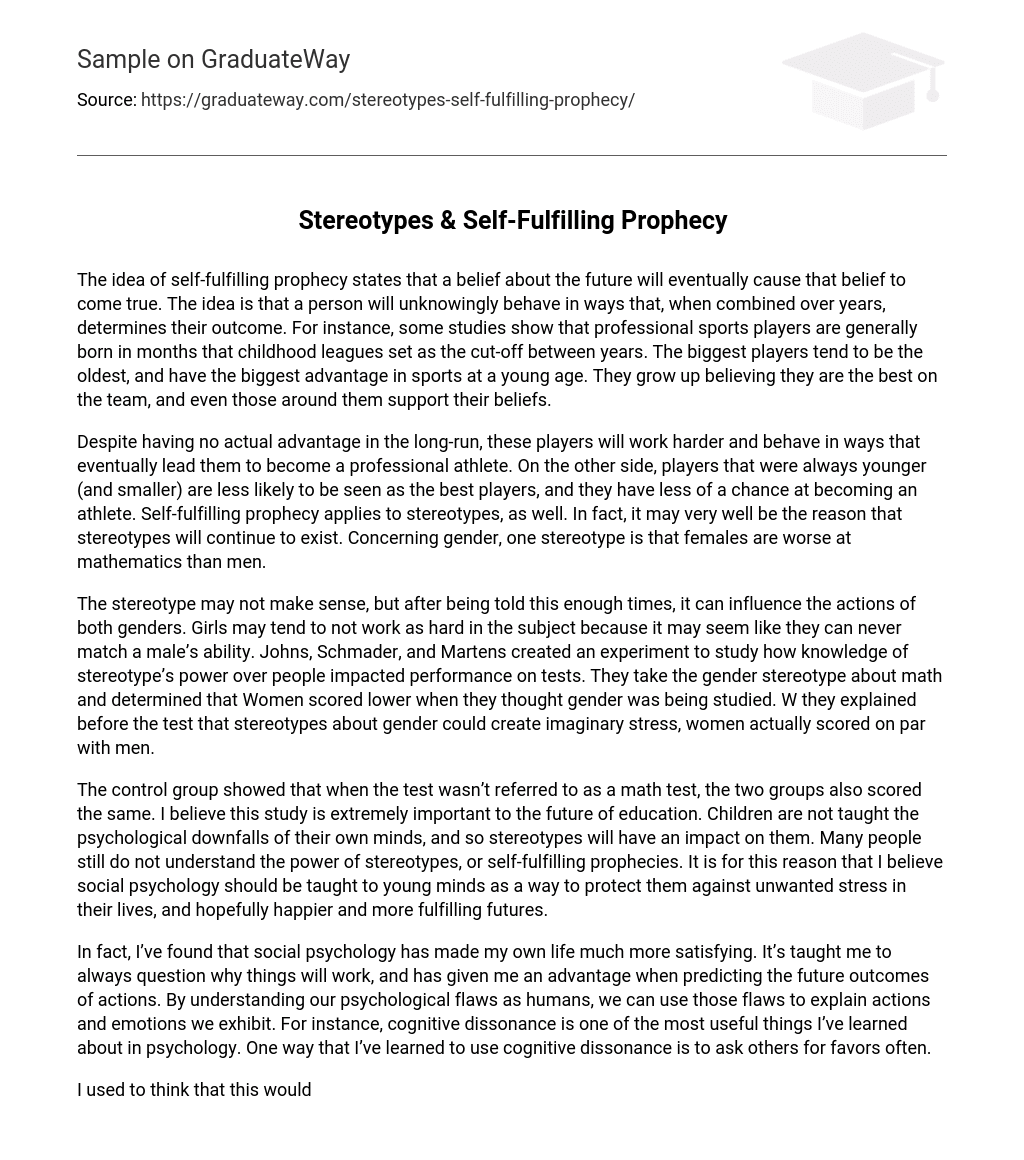The concept of self-fulfilling prophecy suggests that a belief regarding the future will ultimately lead to its realization. It posits that individuals unknowingly display behaviors over time that shape their outcomes. For example, research indicates that professional athletes are usually born in months that serve as age cutoffs in childhood sports leagues. Consequently, the eldest players often possess a significant advantage in sports from an early age. They develop a belief in their superior abilities and receive validation from those around them.
Despite lacking any real benefit in the long term, these individuals will exert more effort and display behaviors that ultimately propel them towards a career as a professional athlete. Conversely, younger and smaller players are less likely to be regarded as top performers, thus diminishing their prospects of becoming athletes. Stereotypes are also subject to the self-fulfilling prophecy phenomenon, which may perpetuate their existence. Gender-wise, a prevalent stereotype suggests that women are less proficient in mathematics compared to men.
Despite the illogicality of the stereotype, repeated exposure to it can affect the behavior of individuals of both genders. For girls, this may result in a decreased effort in certain subjects due to the perception that they can never match the abilities of males. To further investigate the influence stereotypes have on people’s performance, Johns, Schmader, and Martens conducted an experiment focusing on the power of stereotype knowledge. Specifically, they examined how belief in gender stereotypes regarding math affected test scores. The findings showed that women performed worse when they were aware that their gender was being studied. However, when they were informed prior to the test that stereotypes about gender can create a cognitive burden, women’s scores were on par with men.
The control group demonstrated that when the test was not labeled as a math test, both groups achieved similar scores. In my opinion, this study holds great significance for the advancement of education. Children are not educated about the negative effects of their own psychology, hence stereotypes can influence them. Numerous individuals still lack comprehension of the influence of stereotypes or self-fulfilling prophecies. This is why I advocate for the teaching of social psychology to young individuals – to safeguard them against undesired stress and foster happier and more satisfying futures.
By studying social psychology, I have significantly enhanced the satisfaction in my life. It has fostered in me a habit of constantly questioning the efficacy of various actions and has endowed me with the ability to predict future outcomes. Through comprehending our inherent psychological imperfections, we can effectively elucidate and comprehend our actions and emotions. Cognitive dissonance, in particular, has been an invaluable concept that I have gained from psychology. It has enabled me to utilize the phenomenon of cognitive dissonance to my advantage by frequently seeking assistance from others.
Prior to my realization, I held the misconception that appearing dependent and annoying was the outcome of requesting favors. However, it turns out that individuals develop a fondness for you when compelled to do something favorable for you. The brain experiences dissonance by engaging in kind acts towards someone they dislike. To mitigate this discomfort, the brain rationalizes the action by acknowledging that the other person truly deserved the benevolent gesture. Consequently, I have now grasped the tactic of “accidentally” dropping my pen near the attractive girl seated adjacent to me. I firmly believe that social psychology holds value in all aspects of life, rendering it a more advantageous subject to study than any other in school.
Understanding how people are influenced by others is beneficial for everyone. The current education model, which focuses on teaching facts, often leads to robotic thinking. I think society would be better off if people learned to question everything. I don’t want to say that religion has a negative impact on society, but many religious believers didn’t have a choice in their beliefs while growing up. While we are encouraged to think independently, many parents contradict this by imposing the belief that there is only one true religion.
In my opinion, it is unjust to impose religion on children who lack independent thinking ability. This imposition has long-lasting consequences and provides solutions to questions that our society should continually contemplate (e.g., the purpose of life). I hold the belief that religion hinders humanity’s overall advancement by addressing fundamental life inquiries and serves as a distraction. To address this, I propose instructing children on the susceptibility of minds to manipulation. By showcasing the world’s cultural diversity, children can develop an understanding that individuals possess varying perspectives and that there is no singular correct way of thinking.
I believe that if children are consistently encouraged to question what they are told, they will develop a greater curiosity about others’ perspectives. This may lead to a significant social transformation addressing the influence of stereotypes and other cognitive errors. However, there is a potential challenge in children comprehending complex concepts such as those presented in social psychology. Personally, I consider myself fortunate to have begun questioning aspects like religion and social influence during my early years.
My bias towards having others do the same might be impacting my ability to gauge the capabilities and interests of young minds when it comes to comprehending these concepts. It is also possible that teaching these concepts could disrupt the prevailing societal norms and adversely affect people’s lives. For instance, I hold the belief that religion would not exist if it did not serve a purpose at some point. Religion provides solace for those who have nothing else to hold onto, and it may not be suitable for everyone to be educated about the existence of unanswerable questions.





